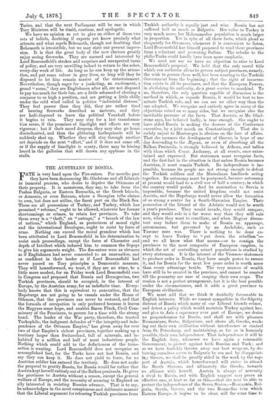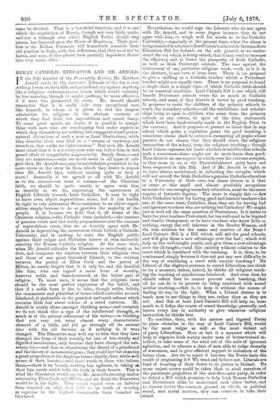THE AUSTRIANS IN BOSNIA.
FATE is very hard upon the Fire-eaters. For months past they have been denouncing Mr. Gladstone and all Liberals as immoral persons, who desire to deprive the Ottomans of
their property. It is monstrous, they say, to take from the Pashas Bulgaria, or Eastern Roumelia, or the Greek Islands, or Armenia, or even Batoum, where a Georgian tribe claims to own, but does not utilise, the finest port on the Black Sea. These are all possessions of Turkey, and Turkey, which has promised "reforms," ought to be allowed, whatever her former shortcomings or crimes, to retain her provinces. To take them away is a "theft," an "outrage," a "breach of the law of nations," which England, as protectress of moral right and the international Decalogue, ought to resist by force of arms. Nothing can exceed the moral grandeur which has been attributed to Lord Beaconsfield in his determination to resist such proceedings, except the force of Character and depth of Intellect which induced him to summon the Sepoys to give his arguments weight. The fire-eaters were as virtuous as if Englishmen had never consented to an annexation, and as confident in their leader as if Lord Beaconsfield had never passed on Tory principles a Democratic measure.
They will henceforward, we trust, if they are no wiser, be a little more modest, for on Friday week Lord Beaconsfield rose in Congress and proposed that Bosnia and Herzegovina, two Turkish provinces, should be occupied, in the interest of Europe, by the Austrian army, for an indefinite time. Every- body knows that this is equivalent to annexation, that the Hapsburgs are not going to be vassals under the House of Othman, that the provinces can never be restored, and that the formula of occupation is only preferred because it leaves the Magyars some hope, and enables Baron Pluck, Civil Com- missary of the Provinces, to govern for a time with the strong
hand. The leader of the War party, therefore, the trusted Turkophile, the indignant defender of "the integrity and inde- pendence of the Ottoman Empire," has given away for ever• two of that Empire's richest provinces, together making up a territory larger than Switzerland, full of minerals, and in- I habited by a million and half of most industrious people. Nothing which could add to the definiteness of the trans- action is wanting. Lord Beaconsfield does not recognise an I
accomplished fact, for the Turks have not lost Bosnia, and say they can keep it. He does not yield to force, for no
Austrian soldier has entered the territory. He does not make the proposal to gratify Russia, for Russia would far rather that Austria kept herself entirely out of the Balkan peninsula. He gives the provinces to Austria without a reason, except the general welfare of Europe, and the necessity of securing to England an ally interested in resisting Russian advance. That is to say, he acknowledges in the most conspicuous and deliberate manner ' that the Liberal argument for releasing Turkish provinces from I
Turkish authority is equally just and wise. Bosnia has not suffered half as much as Bulgaria. Her value to Turkey is very much more, her Mahommedan population is much larger in proportion. Yet in spite of all these facts, which plead so eloquently for Ottomans, whenever it is convenient to listen, Lord Beaconsfield has himself proposed to rend these provinces from a reluctant and protesting Sultan. The rebuke to the philo-Turks could hardly have been more emphatic. We need not say we have no objection to raise to Lord Beaconsfield's proposal. We hold that the only moral title which can authorise aliens to govern subject provinces, namely, the wish to govern them well, has been wanting to the Turkish Government from the beginning ; that the right of insurrec- tion exists in all its provinces, and that the European Powers, in abolishing its authority, do a great service to mankind. To us, therefore, the only question capable of discussion is the method in which, as regards Bosnia, it would be best to ter- minate Turkish rule, and we can see no other way than the one adopted. We recognise and entirely agree in many of the objections raised on so ninny sides, but we recognise also the inevitable pressure of the facts. That Austria, as Mr. Glad- stone says, has behaved badly, is true enough. She ought to have aided Russia in making the decrees of the Conference executive, by a joint march on Constantinople. That she is rudely unjust to Montenegro is obvious on the face of affairs. That she menaces the development of Greece, in hope of one day descending to the 2Egean, or even of absorbing all the Balkan Peninsula, is strongly believed in Athens, and tallies with ideas which Count Andrassy, at all events, once enter- tained and expressed. But statesmen must recognise facts, and the first fact in the situation is that unless Bosnia becomes Austrian, it must remain Turkish. Its independence is im- possible, because its people are not strong enough to defeat the Turkish soldiers and the Mussulman landlords acting together. Its autonomy must be postponed, because autonomy at present would lead to a civil war of half a century, in which the country would perish. And its annexation to Servia is impossible, because the united kingdom could not resist Austria, and the Hapsburgs would never allow the formation of so strong a centre for a South-Slavonian Empire. Their possession of the littoral of the Adriatic would not be worth a year's purchase. They would invade, they would conquer, and they would rule in a far worse way than they will rule now, when they want to conciliate, and when Magyar discon- tent may induce them to make of Bosnia an appanage, autonomous, but governed by an Archduke, such as Tuscany once was. There is nothing to be done ex- cept to leave Turkey to "put down the rebellion "— and we all know what that means—or to consign the provinces to the most composite of European empires, in which the art of controlling mixed populations is studied by every statesman. It is the interest of the Viennese statesmen to produce order in Bosnia, they have ample power to ensure it, and for Bosnia for the next few years order is worth more than every advantage beside. The very sources of wealth have still to be created in the province, and cannot be created till the peasantry are sure of reaping their own crops. The cession is not a perfect arrangement, but it is the best possible under the circumstances, and it adds a great province to European civilisation.
We must add that we think it decidedly favourable to English interests. While we cannot sympathise in the fidgetty distrust of Russia which many of our Liberal friends evince, and detest a policy which would maintain Turkey against her, and gi ire to Asia a supremacy over part of Europe, we desire no preponderance for Russia, and shall see with pleasure Roumanians, Serbs, Bulgarians, and above all, Greeks, work- ing out their own civilisation without interference or control from St. Petersburg, and maintaining, as far as is humanly possible, their own independence. That independence it will be the English duty, whenever we have again a reasonable Government, to protect against both Russian and Turk ; and as we have foolishly thrown away our best weapons, by de- barring ourselves access to Bulgaria by sea and by disappoint- ing Greece, we shall be greatly aided in the work by the sup- port of Austria, which henceforward will strive to attract
the South Slavons, and ultimately the Greeks, towards an alliance with herself. Austria is always of necessity a rival to Russia, and with English support may prove an effective one, at least so far as this,—that she may be able to protect the independence of the Seven States,—Roumania, Bul- garia, Servia, Greece, and the two Roumelias into which Eastern Europe it begins to be clear, will for some time to come be divided. That is a beneficial function, and it is one which the acquisition of Bosnia, though not very fairly made, and not a triumph over which English Tories should sing imams, has imposed upon the House of Hapsburg. Their posi- tion,in the Balkan Peninsula will henceforth resemble their old position in Italy, with this difference, that they need not be hated, and may, if they please, turn partially dependent States into very warm allies.



































 Previous page
Previous page